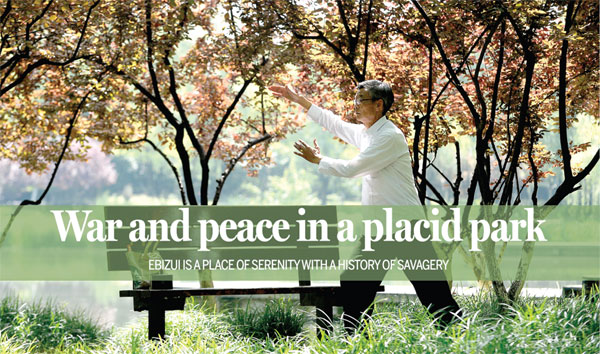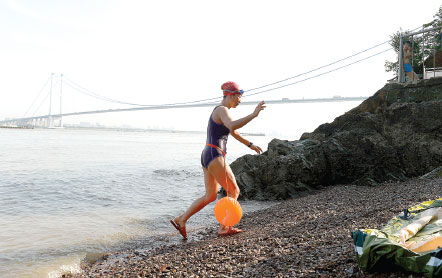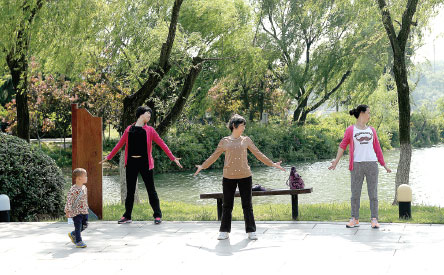War and peace in a placid park
ebizui is a place of serenity with a history of savagery
Ebizui Park is a peaceful place built over blood and bombs.
That's not to mention disembodied eyeballs that foresaw the future before being scooped out - at their owner's request.
Upon his forced suicide.
That is, as a true witness to vengeance's brutal irony.
It's today a serene scenic spot, where tots toss pebbles to cast ripples upon waves. Parents roll up pant legs to wade. Families picnic beneath trees.
A man with a conical hat and goatee bobs along the river aboard an inflatable raft.
He's paddling from Hubei's provincial capital, Wuhan, in Central China, to Shanghai, where the world's third-longest watercourse empties into the East China Sea.
The guy is undertaking the voyage in what's essentially a life raft.

It's the furthest thing from a warship.
Godspeed.
Over the centuries, the site that's now Ebizui has hosted a launching pad for successful invasions of kingdoms, a cannon mount to splinter smugglers' ships and a bomb shelter plus arsenal during the Japanese invasion.
If war ghosts exist, they haunt here.
|
Ebizui Park is by the Yangtze River. |
Ebizui's blessing and curse is its historically strategic position.
Indeed, the slenderest contraction of the Yangtze River, downstream from its northwestern source and near where it ejects to the sea in the southeast, was a prime piece of real estate in wartimes.
The locale where the waterway sucks in its gut to just 1.2 kilometers is a painful place to hit beneath its tightened belt, strategically speaking.
|
Morning exercises in the park. photos by wei xiaohao / China Daily |
Hence the 216-meter-long tunnel under Swan Hill, built as a refuge against air raids and store for weaponry during the War of Resistance Against Japanese Aggression (1937-45).
Its mouth opens to the Wu Zixu Pavilion, constructed in modern times to mark the port from which the ancient military mastermind is said to have sailed across the river leading the army of Wu to vanquish his native kingdom of Chu - whose leaders had framed and executed his father and brother, inspiring his defection.
He won vengeance in this life.
The subsequent king of Wu - exasperated by Wu Zixu's insistence the subjugated nation of Yue should be totally conquered and its king, reduced to cleaning Wu's royal toilets, killed - sent Wu Zixu a sword.
Wu's monarch commanded he kill himself.
Which he did.
But not before requesting his eyes be sliced out and perched atop the east gate of Suzhou, Wu's capital.
Which they were.
That's so he could watch the Yue kingdom conquer Wu.
Which it did.
That was his revenge in the afterlife.
This happened a decade later, at which point Wu Zixu's ocular organs had in reality at best shriveled like raisins.
Too bad. Perhaps. Depends on who writes the history books.
Yue's king rose from polishing imperial potties to sit upon the throne of a vaster empire than he'd lost.
Lamps today defer to more modern military legacies.
Ground lights shine from casings shaped like helmets. Those perched upon posts take the form of bullets that shoot down light instead of death.
That is, they illuminate a place of peaceful pleasure that not only is separate from the wars of ages past but also offers refuge from the relentlessness of contemporary life's skirmishes.
It's a truly tranquil place to play today.
erik_nilsson@chinadaily.com.cn
(China Daily 07/15/2016 page45)
















